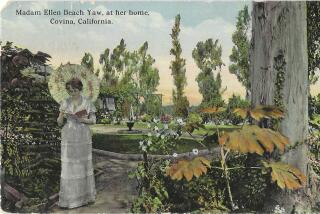Stella Roman; Celebrated Operatic Star
- Share via
Stella Roman, one of the final links to opera’s glorious past, died Wednesday morning in New York City.
The Romanian-born dramatic soprano, celebrated for three decades throughout Europe and on both coasts of the United States, was 88. She died at Mt. Sinai Hospital, a spokeswoman confirmed.
Her son, Dr. Flaviu Romanul, said she died of cardiac arrest.
At the height of her career in the mid-1930s, she was constantly creating roles in contemporary operas. Among them were Richard Strauss’ “Friedentag,” the role of Cordelia in Alberto Chislanzoni’s “King Lear” and the empress in “Die Frau ohne Schatten” where under Strauss’ direction she made her entrance at La Scala singing a high D.
By then she had also mastered most of the more traditional roles that were to sustain her career through the early 1950s when she retired: “Aida,” “La Forza del Destino,” “Tosca,” “Tannhauser,” “Otello”, “Madama Butterfly” “Der Rosenkavalier” and several more.
For several consecutive years during World War II, she was the favored “Aida” in San Francisco Opera productions at the Shrine Auditorium.
Early in her career, Olin Downs of the New York Times called her “a superb singer, a superb actress and a superb interpreter.” Los Angeles Times critic Isabel Morse Jones found her 1941 portrayal of Amelia in “Simon Boccanegra” at the Shrine “simple and sincere” and her voice “ideal and “rich.”
Sharing the stage with her that November night were Ezio Pinza and Lawrence Tibbett with Erich Leinsdorf conducting.
Born Florica Vierica Alma Stela Blasu in Cluj, Romania, her father, an Austrian Army colonel, sent her to the celebrated Hernals school for girls, where she shared classrooms with Hapsburg princesses.
She studied voice in Bucharest and Milan before a triumphal debut in Bologna as Maddalena in “Andrea Chenier.” One of her teachers in Italy had been Hariclea Darclee, Puccini’s first “Tosca.”
Miss Roman quickly became known for her versatility and ability to quickly master substantial roles.
She made her Metropolitan Opera debut as “Aida” in 1941 and sang primarily the Italian wing through that decade. The diva was also performing and touring with the San Francisco company and appearing on radio in “The Voice of Firestone,” “Invitation to Music” and “Treasury Hour of Song.”
Although she never recorded commercially, her voice is preserved on several private discs and on tapes from various Metropolitan Opera broadcasts in the 1940s.
They reveal a soprano of purity and beauty with what has been described as a well-controlled, exciting vibrato.
“Stella Roman was one of the last of the great Italianate divas, an artist of enormous communicative warmth, a superb technician and a knowing stylist,” said Times music and dance critic Martin Bernheimer. “Her full-bodied, gleaming soprano was equally responsive to delicate introspection and sweeping passion. She represented a link to a golden age.” After living in Los Angeles for some time, she had spent her final years in New York City.
Besides her son, a neurologist who lives in Brookline, Mass., she is survived by four grandchildren.
More to Read
The biggest entertainment stories
Get our big stories about Hollywood, film, television, music, arts, culture and more right in your inbox as soon as they publish.
You may occasionally receive promotional content from the Los Angeles Times.










